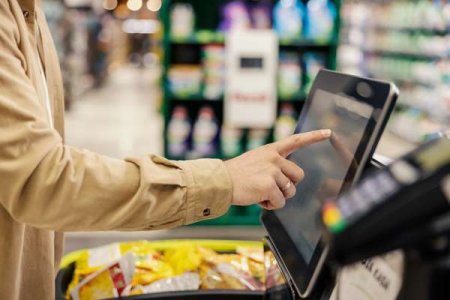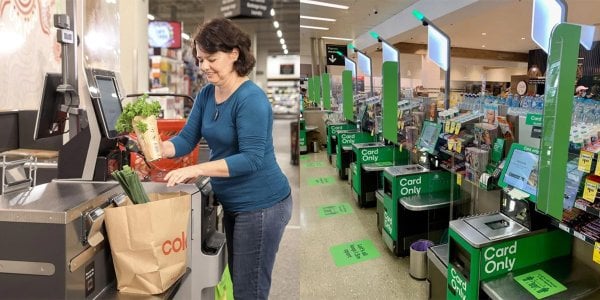Are Coles and Woolies the only ones that still want self-serve checkouts? Retailers worldwide are ditching this feature
By
Seia Ibanez
- Replies 44
Is the self-serve checkout a modern convenience or a controversial nuisance? This question has been at the heart of a global debate among retailers and shoppers recently.
It comes after a growing number of retailers are abandoning self-serve checkouts in response to customer feedback.
However, Australian supermarket giants Coles and Woolworths appear to be resisting this trend.
Self-serve checkouts were introduced to retail chains globally nearly a decade ago. The goal was to expedite the checkout process and reduce labour costs by decreasing the need for cashiers.
However, these systems have not been universally embraced by shoppers, who sometimes preferred a human cashier’s assistance.
In response to years of customer complaints, several retailers have decided to remove their self-serve checkouts. American superstore Walmart and UK grocery chain Booths have recently announced such changes, citing complaints about a lack of service and human interaction.
Canadian Tires, one of Canada's largest discount department stores, also followed suit, removing all self-checkout stalls in its Mississauga and North Bay, Ontario, stores.
Dwayne Ouelette, who took over the North Bay location, explained the decision.
'I’m not comfortable using them, and I don’t think some of my customers are comfortable [either],’ he said.
‘I’d rather my customers see my cashiers and if there’s any questions or concerns, at least there’s somebody they can talk to.’
The move has been met with applause from shoppers at Canadian Tire, many of whom expressed relief at the removal of the self-serve checkouts.
'I think that it’s much more customer-focused. It’s not relying on the customer to do the job for the retailer,' one shopper said.
Another said, ‘I’m happy to see that their self-checkouts are gone.’
Walmart stores in Albuquerque, New Mexico, also abandoned self-checkout, along with another supermarket in England.
However, the issue is not just about customer service. Retailers have also had to grapple with increased theft at self-serve checkouts.
In Australia, Coles and Woolworths have both implemented new security measures this year to combat shoplifting, which is estimated to cost the Australian retail industry a staggering $9 billion annually.
There were also reports of an increase in violent behaviour towards retail and supermarket workers. Some shoppers have also been stealing from service stations, cafes, and shops as the cost of living rises.
‘If you’re a thief, we’re gonna catch ‘ya,’ Coles’ Chief Operating Officer Matt Swindells said.
In a Finder survey of over 1000 respondents, 12 per cent confessed to stealing over the past 12 months due to financial stress—this amounts to 2.4 million people in the country.
Five per cent of Australians stole items at the supermarket self-checkout, while four per cent lied about what they scanned. For instance, they were telling the computer that it was weighing onions instead of avocados.
‘A lot of people are doing it tough as the cost of essentials like petrol, rent, and energy have risen sharply,’ Finder’s Money Expert Richard Whitten explained.
An anonymous supermarket worker shared how they confronted shoplifters every day for five years. They revealed that they confronted people from all walks of life—some are professionals, well-dressed to deceive, while others are simply trying to get by. Read more about the story here.
‘The result is a growing subset of Australians who are stealing consumables to survive.’
The new security measures track shoppers’ every move inside the store. These measures include overhead cameras, trolley locks, smart gates, and antitheft fog machines.
Despite these challenges, Coles and Woolworths have resisted calls to abandon self-serve checkouts entirely. They stated that ‘millions of transactions are made using our self-service check-outs every single day’.
'We know some customers prefer to be served by a team member, and that’s why there is always that option in all of our stores,' a Woolies spokesperson said at the time.
‘The use of self-service technology is commonplace from airports to railway stations, and customer feedback shows our self-serve check-outs are popular for their convenience and speed.’
However, US Credit Analyst Matt Schulz suggested that retailers worldwide were ‘wrestling’ with the question of whether the convenience of self-checkout is worth the risk of increased theft.
'While self-checkout is convenient, it certainly poses a risk for shoplifting,' he said.
'Ultimately, retailers need to decide whether the self-checkout terminals are worth the risk.'
‘I don’t think self-checkout’s going to go away entirely, but I think we’re going to see a lot of retail swing back into a more balanced choice for shoppers.’
 What are your thoughts on self-serve checkouts? Do you prefer them for their convenience, or do you miss the human interaction of a traditional checkout? Share your thoughts in the comments below.
What are your thoughts on self-serve checkouts? Do you prefer them for their convenience, or do you miss the human interaction of a traditional checkout? Share your thoughts in the comments below.
It comes after a growing number of retailers are abandoning self-serve checkouts in response to customer feedback.
However, Australian supermarket giants Coles and Woolworths appear to be resisting this trend.
Self-serve checkouts were introduced to retail chains globally nearly a decade ago. The goal was to expedite the checkout process and reduce labour costs by decreasing the need for cashiers.
However, these systems have not been universally embraced by shoppers, who sometimes preferred a human cashier’s assistance.
In response to years of customer complaints, several retailers have decided to remove their self-serve checkouts. American superstore Walmart and UK grocery chain Booths have recently announced such changes, citing complaints about a lack of service and human interaction.
Canadian Tires, one of Canada's largest discount department stores, also followed suit, removing all self-checkout stalls in its Mississauga and North Bay, Ontario, stores.
Dwayne Ouelette, who took over the North Bay location, explained the decision.
'I’m not comfortable using them, and I don’t think some of my customers are comfortable [either],’ he said.
‘I’d rather my customers see my cashiers and if there’s any questions or concerns, at least there’s somebody they can talk to.’
The move has been met with applause from shoppers at Canadian Tire, many of whom expressed relief at the removal of the self-serve checkouts.
'I think that it’s much more customer-focused. It’s not relying on the customer to do the job for the retailer,' one shopper said.
Another said, ‘I’m happy to see that their self-checkouts are gone.’
Walmart stores in Albuquerque, New Mexico, also abandoned self-checkout, along with another supermarket in England.
However, the issue is not just about customer service. Retailers have also had to grapple with increased theft at self-serve checkouts.
In Australia, Coles and Woolworths have both implemented new security measures this year to combat shoplifting, which is estimated to cost the Australian retail industry a staggering $9 billion annually.
There were also reports of an increase in violent behaviour towards retail and supermarket workers. Some shoppers have also been stealing from service stations, cafes, and shops as the cost of living rises.
‘If you’re a thief, we’re gonna catch ‘ya,’ Coles’ Chief Operating Officer Matt Swindells said.
In a Finder survey of over 1000 respondents, 12 per cent confessed to stealing over the past 12 months due to financial stress—this amounts to 2.4 million people in the country.
Five per cent of Australians stole items at the supermarket self-checkout, while four per cent lied about what they scanned. For instance, they were telling the computer that it was weighing onions instead of avocados.
‘A lot of people are doing it tough as the cost of essentials like petrol, rent, and energy have risen sharply,’ Finder’s Money Expert Richard Whitten explained.
An anonymous supermarket worker shared how they confronted shoplifters every day for five years. They revealed that they confronted people from all walks of life—some are professionals, well-dressed to deceive, while others are simply trying to get by. Read more about the story here.
‘The result is a growing subset of Australians who are stealing consumables to survive.’
The new security measures track shoppers’ every move inside the store. These measures include overhead cameras, trolley locks, smart gates, and antitheft fog machines.
Despite these challenges, Coles and Woolworths have resisted calls to abandon self-serve checkouts entirely. They stated that ‘millions of transactions are made using our self-service check-outs every single day’.
'We know some customers prefer to be served by a team member, and that’s why there is always that option in all of our stores,' a Woolies spokesperson said at the time.
‘The use of self-service technology is commonplace from airports to railway stations, and customer feedback shows our self-serve check-outs are popular for their convenience and speed.’
However, US Credit Analyst Matt Schulz suggested that retailers worldwide were ‘wrestling’ with the question of whether the convenience of self-checkout is worth the risk of increased theft.
'While self-checkout is convenient, it certainly poses a risk for shoplifting,' he said.
'Ultimately, retailers need to decide whether the self-checkout terminals are worth the risk.'
‘I don’t think self-checkout’s going to go away entirely, but I think we’re going to see a lot of retail swing back into a more balanced choice for shoppers.’
Key Takeaways
- Retailers around the world, including American superstore Walmart, UK grocery chain Booths, and Canadian Tires, are removing self-service checkouts following customer complaints about a lack of service and human interaction.
- In Australia, supermarket chains Coles and Woolworths have resisted calls to abandon self-service checkouts despite increasing thefts and violent behaviour towards workers.
- These supermarkets have introduced new technologies to combat shoplifting, such as overhead cameras, trolley locks, smart gates and antitheft fog machines.
- A recent survey showed that 12 per cent of Australians have confessed to stealing in the past 12 months due to financial stress, and 5 per cent had stolen items at the supermarket self-checkout.









